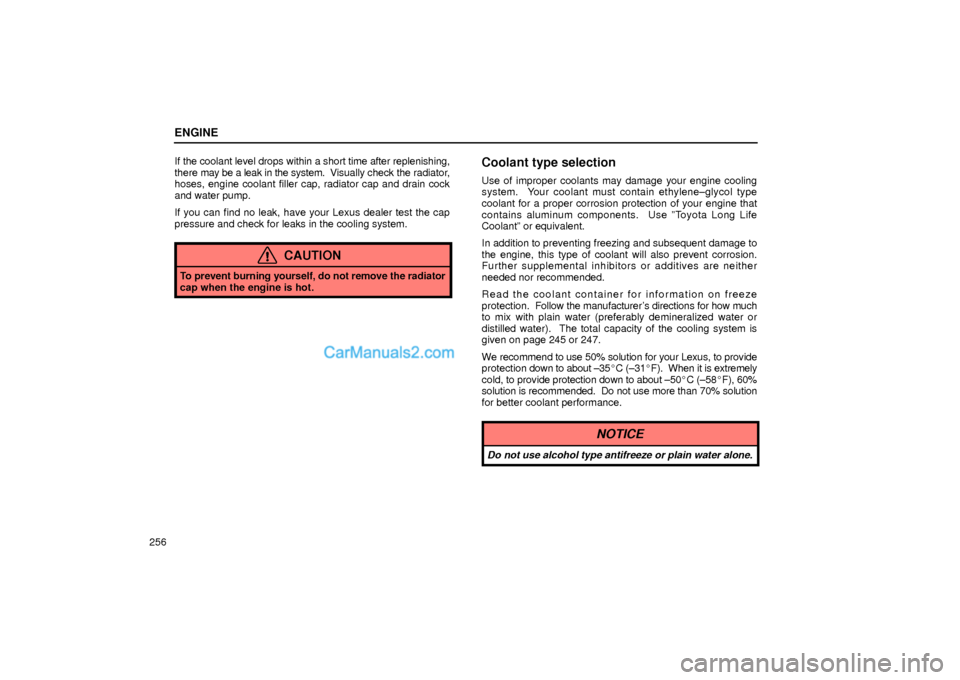Page 3 of 16
ENGINE
245 ± COOLING SYSTEM
Capacity
Coolant type
9.0 L (9.5 qt., 7.9 lmp.qt.)
ºToyota Long Life Coolantº or equivalent
With ethylene±glycol type coolant for a proper corrosion
protection of aluminum components
Do not use alcohol type antifreeze or plain water alone.
± FUEL
Fuel type
Octane rating
Only UNLEADED
91 (Research octane number 96) or higher
± IGNITION SYSTEM
Spark plug ± Make DENSO
NGK
± Gap
SK20R11
IFR6A11
1.1 mm (0.043 in.)
± ELECTRICAL SYSTEM
Battery Open voltage at 20�C (68�F):
Charging rates
12.7V Fully charged
12.3V Half charged
11.9V Discharged
[Voltage that is checked 20 minutes after the key is removed
with all the lights turned off]
5A max.
Page 5 of 16
ENGINE
247 ± COOLING SYSTEM
Capacity
Coolant type
7.7 L (8.1 qt., 6.8 lmp.qt.)
ºToyota Long Life Coolantº or equivalent
With ethylene±glycol type coolant for a proper corrosion
protection of aluminum components
Do not use alcohol type antifreeze or plain water alone.
± FUEL
Fuel type
Octane rating
Only UNLEADED
91 (Research octane number 96) or higher
± IGNITION SYSTEM
Spark plug ± Make DENSO
± Gap
SK16R±P11
1.1 mm (0.043 in.)
± ELECTRICAL SYSTEM
Battery ± Open voltage at 20�C (68�F):
Charging rates
12.7V Fully charged
12.3V Half charged
11.9V Discharged
[Voltage that is checked 20 minutes after the key is removed
with all the lights turned off]
5A max.
Page 9 of 16

ENGINE
251
FACTS ABOUT ENGINE OIL
CONSUMPTION
Functions of engine oil
Engine oil has the primary function of lubricating and cooling
the inside of the engine, and plays a major role in maintaining
the engine in proper working order.
Engine oil consumption
It is normal that an engine should consume some engine
oil during normal engine operation. The causes of oil
consumption in a normal engine are as follows.
�Oil is used to lubricate pistons, piston rings and cylinders.
A thin film of oil is left on the cylinder wall when a piston
moves downwards in the cylinder. High negative pressure
generated when the vehicle is decelerating sucks some of
this oil into the combustion chamber. This oil as well as
some part of the oil film left on the cylinder wall is burned by
the high temperature combustion gases during the
combustion process.
�Oil is also used to lubricate the stems of the intake valves.
Some of this oil is sucked into the combustion chamber
together with the intake air and is burned along with the fuel.
High temperature exhaust gases also burn the oil used to
lubricate the exhaust valve stems.The amount of engine oil consumed depends on the
viscosity of the oil, the quality of the oil and the way the
vehicle is driven.
More oil is consumed under driving conditions such as high
speeds and frequent acceleration and deceleration.
A new engine consumes more oil, since its pistons, piston rings
and cylinder walls have not become conditioned.
When judging the amount of oil consumption, keep in
mind that the oil may have become diluted, making it
difficult to judge the true level accurately.
For example, if a vehicle is used for repeated short trips and
consumes a normal amount of oil, the dipstick may not show
any drop in the oil level at all, even after 1000 km (600 miles)
or more. This is because the oil is gradually becoming diluted
with fuel or moisture, making it appear that the oil level has not
changed.
The diluting ingredients evaporate out when the vehicle is then
driven at high speeds, as on an expressway, making it appear
that oil is excessively consumed after driving at high speeds.
Page 14 of 16

ENGINE
256If the coolant level drops within a short time after replenishing,
there may be a leak in the system. Visually check the radiator,
hoses, engine coolant filler cap, radiator cap and drain cock
and water pump.
If you can find no leak, have your Lexus dealer test the cap
pressure and check for leaks in the cooling system.
CAUTION
To prevent burning yourself, do not remove the radiator
cap when the engine is hot.
Coolant type selection
Use of improper coolants may damage your engine cooling
system. Your coolant must contain ethylene±glycol type
coolant for a proper corrosion protection of your engine that
contains aluminum components. Use ºToyota Long Life
Coolantº or equivalent.
In addition to preventing freezing and subsequent damage to
the engine, this type of coolant will also prevent corrosion.
Further supplemental inhibitors or additives are neither
needed nor recommended.
Read the coolant container for information on freeze
protection. Follow the manufacturer's directions for how much
to mix with plain water (preferably demineralized water or
distilled water). The total capacity of the cooling system is
given on page 245 or 247.
We recommend to use 50% solution for your Lexus, to provide
protection down to about ±35�C (±31�F). When it is extremely
cold, to provide protection down to about ±50�C (±58�F), 60%
solution is recommended. Do not use more than 70% solution
for better coolant performance.
NOTICE
Do not use alcohol type antifreeze or plain water alone.